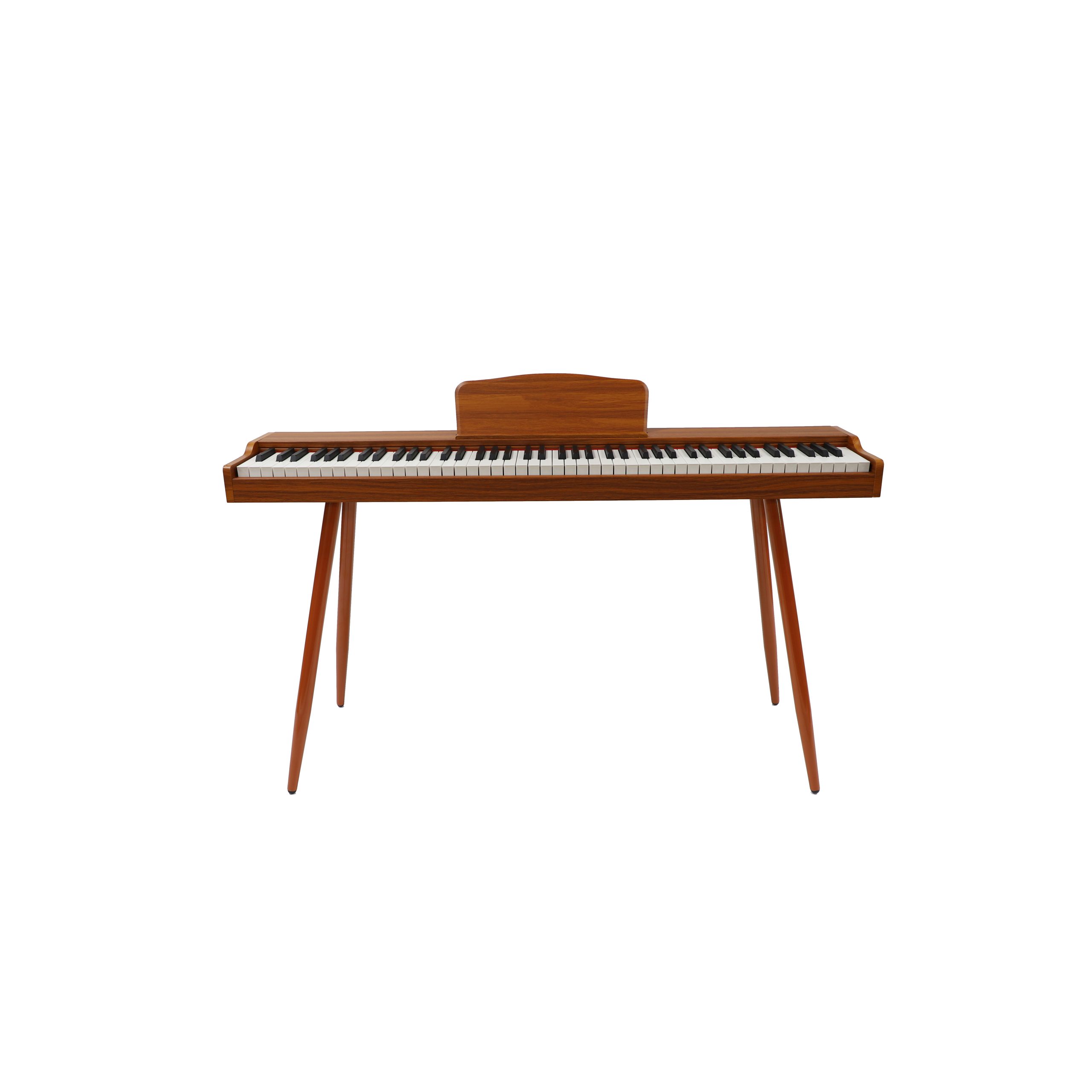Electric pianos, also known as digital pianos, have become an increasingly popular choice for musicians, both beginners and professionals alike. While traditional acoustic pianos have their distinct appeal, electric pianos come with several unique characteristics that make them stand out in the world of musical instruments. In this article, we will explore the key features of electric pianos and compare them to other musical instruments, emphasizing the advantages and potential drawbacks they offer to musicians.
What is an Electric Piano?
Before diving into the comparison, it’s important to understand what an electric piano is. An electric piano is an instrument that replicates the sound and feel of an acoustic piano but uses digital technology to produce its sound. Unlike traditional pianos, which produce sound through physical strings and hammers, electric pianos generate sound electronically, often using pre-recorded samples of an acoustic piano or synthesizer sounds.
The most significant advantage of an electric piano is its versatility. These instruments often come with a variety of sound options and effects, including the ability to mimic other musical instruments like strings, organs, and synthesizers. They are also equipped with built-in speakers and can be easily connected to external devices for enhanced audio performance.
Key Features of Electric Pianos
1. Portability and Convenience
One of the main advantages of electric pianos is their portability. Unlike acoustic pianos, which are large and heavy, electric pianos are lightweight and compact. This makes them ideal for musicians who need to travel or perform in various locations. Whether you’re a traveling musician, a student practicing at home, or a professional gigging musician, an electric piano offers unmatched convenience.
2. Versatility in Sound
Electric pianos can mimic a wide range of sounds beyond the traditional piano. Many models come with hundreds of built-in voices, including sounds from string instruments, brass, and even percussion. This versatility allows musicians to explore different genres and experiment with various musical styles without needing multiple instruments. Whether you’re playing classical music, jazz, pop, or electronic music, an electric piano can adapt to your musical needs.
3. Volume Control and Silent Practice
Unlike acoustic pianos, which can be loud and may disturb others, electric pianos come with volume control features. This allows musicians to practice in quiet environments, making it an excellent choice for those living in apartments or shared spaces. Additionally, most electric pianos come with headphone jacks, allowing for completely silent practice.
4. Digital Connectivity
Electric pianos are equipped with modern digital features, including USB and MIDI connectivity. This allows musicians to connect their instruments to computers, music production software, and other electronic devices. These features open up a world of possibilities for recording, editing, and producing music, making electric pianos a favorite among professional musicians and producers.
5. Tuning Stability
An often-overlooked advantage of electric pianos is their tuning stability. Traditional pianos require regular tuning due to the changes in humidity and temperature that affect the strings. In contrast, electric pianos are not subject to these environmental factors, and their sound remains consistent throughout use. This is particularly beneficial for musicians who perform regularly or in varying conditions.
Comparing Electric Pianos to Other Musical Instruments
Now that we have outlined the key features of electric pianos, it’s time to compare them to other popular musical instruments. Understanding these differences can help you make an informed decision about which instrument best suits your musical style and needs.
Electric Pianos vs Acoustic Pianos
The primary difference between an electric and an acoustic piano lies in how the sound is produced. While an acoustic piano uses hammers and strings to produce sound, an electric piano relies on digital samples or synthesizer technology.
Advantages of Electric Pianos Over Acoustic Pianos:
- Portability: Acoustic pianos are large, heavy, and difficult to transport, while electric pianos are lightweight and easy to move.
- Volume Control: Electric pianos allow musicians to control the volume or practice silently with headphones, something that acoustic pianos cannot offer.
- Cost: Acoustic pianos tend to be much more expensive due to their complex construction and need for regular tuning. Electric pianos, on the other hand, are more affordable and require minimal maintenance.
Advantages of Acoustic Pianos Over Electric Pianos:
- Authentic Feel: Many musicians argue that the touch and feel of an acoustic piano are superior to that of an electric piano. The physical mechanism of hammers striking strings provides a more tactile playing experience.
- Sound Quality: While electric pianos offer excellent sound replication, some musicians feel that acoustic pianos have a richer, more organic tone that is difficult to replicate digitally.
Electric Pianos vs Keyboards
Electric pianos and keyboards may seem similar, but they are different instruments designed for distinct purposes.
Advantages of Electric Pianos Over Keyboards:
- Weighted Keys: Electric pianos usually feature weighted keys that mimic the feel of an acoustic piano. This makes them more suitable for serious piano practice. In contrast, keyboards typically have lighter, non-weighted keys that are better suited for synthesizer-style playing or non-classical genres.
- Sound Quality: Electric pianos are generally equipped with more advanced sound engines and acoustic piano samples, providing a more realistic piano sound. Keyboards, on the other hand, are more focused on electronic sounds and synthesizer effects.
Advantages of Keyboards Over Electric Pianos:
- Affordability: Keyboards tend to be more affordable than electric pianos, making them an attractive choice for beginners or casual musicians.
- Portability and Variety of Sounds: Keyboards are typically more compact and lighter, and they often come with a wide range of non-piano sounds, making them versatile for different genres.
Electric Pianos vs Digital Synthesizers
While digital synthesizers and electric pianos share some similarities, their primary functions differ. Digital synthesizers are designed to create a wide range of electronic sounds, while electric pianos focus on replicating the sound and feel of an acoustic piano.
Advantages of Electric Pianos Over Digital Synthesizers:
- Authentic Piano Experience: Electric pianos are built to replicate the feel and sound of an acoustic piano, making them ideal for classical, jazz, and traditional piano players. Digital synthesizers, while highly versatile, may not provide the same authentic piano experience.
- Ease of Use: Electric pianos are often simpler to use, with fewer features and effects to navigate. This makes them easier for beginners or musicians focused on piano performance.
Advantages of Digital Synthesizers Over Electric Pianos:
- Sound Design Flexibility: Digital synthesizers offer more sound manipulation capabilities, allowing musicians to create unique, experimental sounds. Electric pianos, while versatile, are generally more focused on replicating acoustic piano sounds.
- Complexity and Creativity: For musicians involved in electronic music, film scoring, or sound design, digital synthesizers offer greater creative control and a broader palette of sounds.
Why Choose an Electric Piano?
Choosing an electric piano over other musical instruments offers a variety of benefits, particularly for musicians seeking convenience, versatility, and modern technology. With features such as portability, digital connectivity, sound customization, and the ability to practice silently, electric pianos meet the needs of today’s musicians across all genres. Whether you’re a beginner looking for an affordable and practical instrument or a professional musician seeking a versatile tool for performances and recordings, an electric piano is an excellent choice.
In conclusion, electric pianos provide unique advantages compared to other musical instruments. From their portability and versatility to their modern digital features, they offer significant benefits for musicians of all levels. While acoustic pianos, keyboards, and synthesizers have their own distinct qualities, electric pianos offer an unbeatable combination of realistic piano sounds, ease of use, and advanced functionality.

